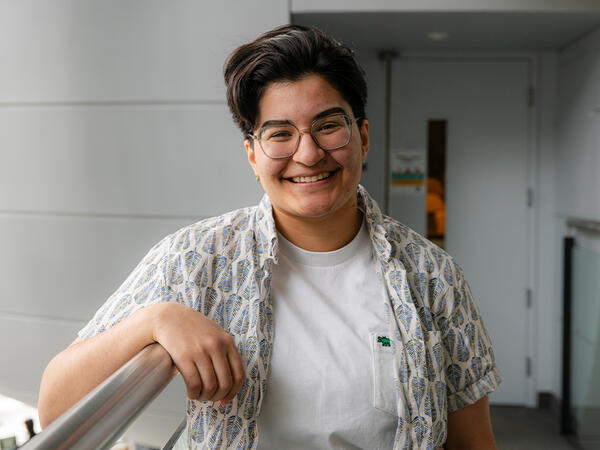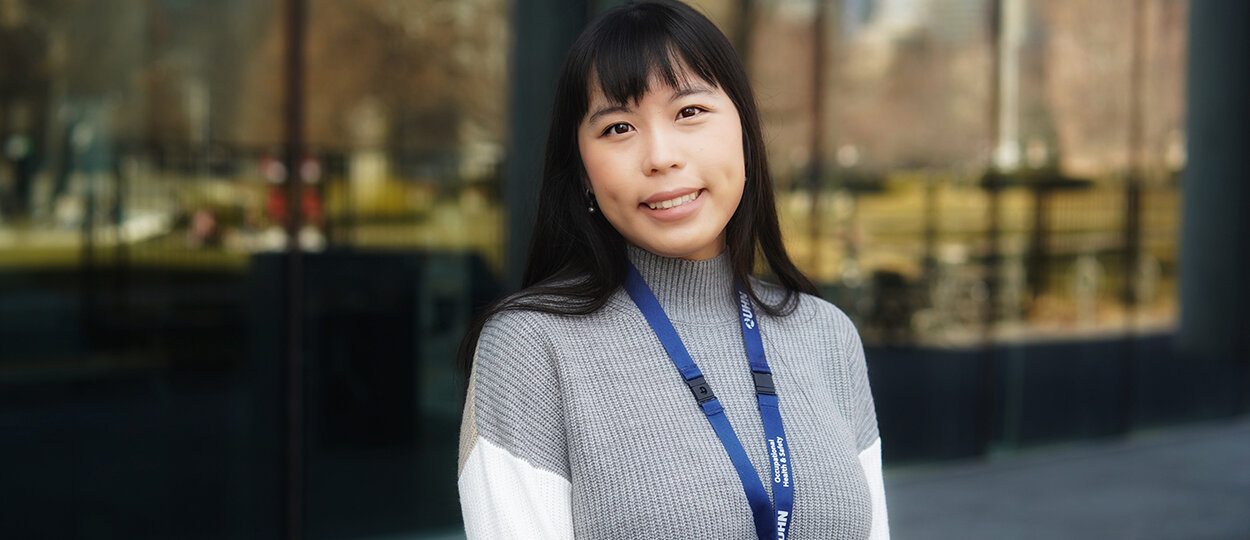What is your academic background and why is this area of research important?
I completed my Bachelor of Medical Sciences degree at the University of Western Ontario in 2019 before starting my graduate studies at the Department of Pharmaceutical Sciences in the Leslie Dan Faculty of Pharmacy. During my undergraduate studies, I had the opportunity to explore and dabble in various research disciplines, which allowed me to discover the area I am most passionate about—cancer research. I became drawn to the field of cancer nanomedicines, which has seen enormous progress and rapid development over the last couple of decades.
Cancer nanomedicines present unique opportunities to address and overcome many of the challenges faced by conventional therapies while possessing the potential to also be used in combination with existing therapies to enhance therapeutic outcomes and reduce adverse effects.
What led you to your current Supervisor’s lab?
While exploring the various areas of cancer research and cancer nanotechnology platforms, I became fascinated with light-activatable cancer nanomedicines and the use of light to be able to focus and confine treatment to only the target tumor area while leaving normal healthy cells and tissues unharmed. This area of research has the immense potential to enhance the treatment of a variety of cancers and reduce the extent of side effects patients face after treatment. This led me to pursue my PhD under the supervision of Dr. Gang Zheng, the Canada Research Chair in Cancer Nanomedicine, and a leading expert in the use and development of light-activable nanoparticles.
The Zheng lab was the first to discover and develop a biodegradable, non-toxic, light-activatable nanoparticle called Porphysomes, which can accumulate in tumours and can function as both a therapeutic and diagnostic imaging agent. This discovery was listed as one of the top 10 cancer breakthroughs of 2011 by the Canadian Cancer Society. I was and still am excited working in the Zheng lab, where I am surrounded by extremely intelligent individuals who share the same passions and research interests as I do.
My project focuses on the development of a novel Porphysome nanotechnology platform for photodynamic therapy (PDT) applications and understanding the mechanisms underlying the increased tumour cell uptake and resulting enhanced PDT efficacy observed with this platform.
What are some of the challenges you had to overcome within your research?
The field of nanomedicine is a rather niche area in cancer research and was never a topic that was covered in my undergraduate courses. Much of what I knew about this field came from the research papers I read outside of my undergraduate studies. There was definitely a learning curve to tackle at the start of my graduate research, from the plethora of new experimental techniques to needing to quickly understand many fundamental papers and concepts. Despite this, I have enjoyed tackling these challenges, which has allowed me to diversify and develop my knowledge and skillset. I have gained invaluable experience from conducting fundamental nanoparticle characterization studies to developing and optimizing my in vitro and in vivo studies. There have been experiments that required months of optimization with a number of pilot studies, along with failed experiments, which have taught me valuable lessons in perseverance and the resilience to push through such hurdles. Since the start of my studies, I continue to discover better methods and refine techniques from personal experience, the experiences of lab members, and from literature to conduct my experiments efficiently and effectively; the learning never stops.
How do you see your current research playing a role in your career?
I have not settled on a specific career path yet; however, I don’t see my passion for cancer research ever fading and plan to pursue a career in which I can bring a positive impact to the cancer field and its patients. I know that the knowledge, experiences, and skills I gained throughout my graduate training and studies will be an invaluable asset for any career path I pursue.
What do you like to do when you are not working on research?
Outside of the lab, I have been a part of the Pharmaceutical Sciences Graduate Student Association (PSGSA) and UofT’s American Association of Pharmaceutical Sciences (AAPS) Student Chapter ever since I first started my graduate studies. I currently serve as the President and Pharmaceutical Sciences Representative of PSGSA and AAPS, respectively. To current and future students, I highly recommend joining any student groups/associations that share your passions, goals, and visions. It is an amazing way to positively impact your community, enhance your graduate experience, and build deep and meaningful connections with other students outside of your lab. Aside from this, I love to spend as much time as I can with my family and friends. I also love to travel, and I plan to do a lot of it once the pandemic ends!
More News
Image

Faces of PharmSci: Mahya Rezaeifarimani
Supervised by Prof. Shirley Wu, PhD student Mahya Rezaeifarimani is developing smart nanoparticles to help make radiation therapy work better for brain tumours by targeting low-oxygen areas that often make treatment less effective.
Read More
Image

Dean Lisa Dolovich reappointed for second term
Professor Lisa Dolovich has been reappointed for a second term as Dean of the Leslie Dan Faculty of Pharmacy, University of Toronto, effective July 1, 2025, to December 30, 2030.
Read More
Image

Pharmacy Summer Camp gives high school students insight into pharmacy profession
A new summer camp based at the faculty will give high school students a range of experiences in pharmacy and pharmaceutical sciences.
Read More
